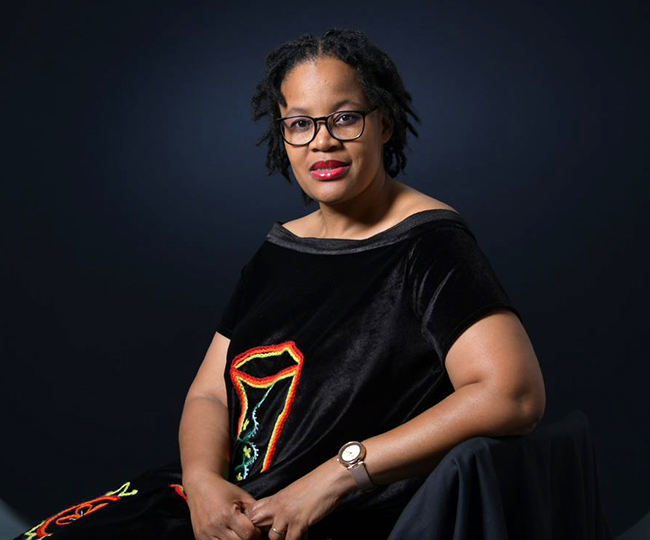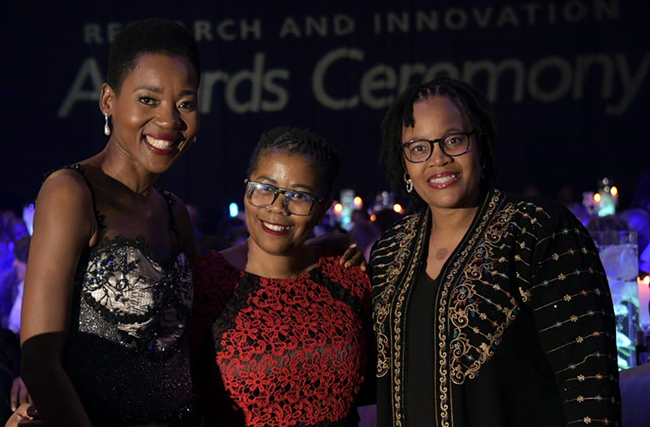College of Education
Empowered to continue upholding academic integrity
Humbled by the Women in Research: Emerging Researcher Award that she received at the recently held 12th Unisa Research and Innovation Awards ceremony, Dr Mpho-Entle Modise of the College of Education’s Department: Curriculum and Instructional Studies, describes it as a token that empowers her academic and research journey. “I am excited and encouraged that I am on the right track,” says Modise.

Dr Mpho-Entle Modise
For Modise, this honour serves as a branding tool that highlights her commitment to excellence and high-calibre research. She adds: “It also means Unisa’s internal and external stakeholders can trust my work.”
Modise’s second name is Puleng, and she is pleased with the ‘triple Puleng-effect’ making a difference in the higher education sector. Other than herself, she acknowledges Professor Puleng LenkaBula, Unisa Principal and Vice-Chancellor and the first female to lead Unisa, and Professor Puleng Segalo, incumbent of the Chief Albert Luthuli Research Chair, who was awarded the Chancellor’s Award for Excellence in Research at the ceremony.

From the left: Prof Puleng Segalo, Prof Puleng LenkaBula and Dr Mpho-Entle Puleng Modise
Remaining relevant in open and distance e-learning environment
Modise’s research interests are in open and distance e-learning (ODeL),continuous professional development of academics and schoolteachers and student support, technology adoption and integration, use of e-portfolios, open educational resources (OERs), and massive open online courses (MOOCs). Having recently focused on these areas, she has also looked at the adoption of a learning management system for facilitating modules in ODeL. “I also focused on the potential of MOOCs as a tool for widening access to higher education in the African context,” she explains. “Also,” Modise continues, “I looked at COVID-19 accelerated training and technology adoption of academics in Nigeria and South Africa.”
Acknowledging that everything she does is interconnected, Modise asserts: “For us to remain relevant, we should constantly develop ourselves and acquire skills that can advance our craft and have an impact in our profession.” Additionally, Modise says that to improve teaching, student learning, and social sustainability, academics must continually seek new methods and technologies. “What inspired me to be in the education field is that our job as ODeL educators is unique as we have the chance to influence the lives of others, locally and globally,” she notes.
According to Modise, she is driven by the need to design an effective and empathetic student support system in an ODeL environment. She says that she is developing and equipping herself with new knowledge and keeping abreast with current trends. She remarks: “This will assist me to improve what I do, including teaching and learning, research, and sharing these lessons with other scholars.”
Reflecting on a fruitful journey
Modise’s research highlights and achievements include receiving the 2022 Doctoral Dissertation Awards from the South Africa Education Research Association (SAERA) and Education Association of South Africa. She is also an executive committee member at SAERA, representing the needs and interests of early career researchers in South Africa and other African countries. Awarded by the UNESCO Chair on Open and Distance Learning, one of Modise’s PhD papers won the Best Paper Award at Unisa’s 2021 ODeL Conference.
“I also received the Digital Humanities Open Educational Resources Champions Initiative. It is a grant by the North-West University UNESCO Chair on Multimodal Learning and Open Educational Resources to develop an OER on using e-portfolios for teaching and learning,” remarks Modise. She has also published three articles in The Conversation Africa, an independent news site that publishes material from the academic and research community.
Modise affirms: “I believe in research for visible beneficial change, and that it should improve our practice and performance as educators, as well as the quality of teaching and support for students.” According to Modise, these research products must evolve with the changing times and changing needs of stakeholders. “Importantly,” Modise concludes, “I believe in academic integrity, research outputs produced with highest ethical principles, understanding our responsibility as researchers, and impactful research products on communities we serve.”
#Unisa150
* By Nancy Legodi, Acting Senior Journalist, Department of Institutional Advancement
Publish date: 2023/05/02

 Unisa co-hosts G20 community outreach in the Eastern Cape
Unisa co-hosts G20 community outreach in the Eastern Cape
 Unisans gain membership of prestigious science academies
Unisans gain membership of prestigious science academies
 Advocating for disability transformation through servant leadership
Advocating for disability transformation through servant leadership
 Unisa Press continues to illuminate the publishing space
Unisa Press continues to illuminate the publishing space